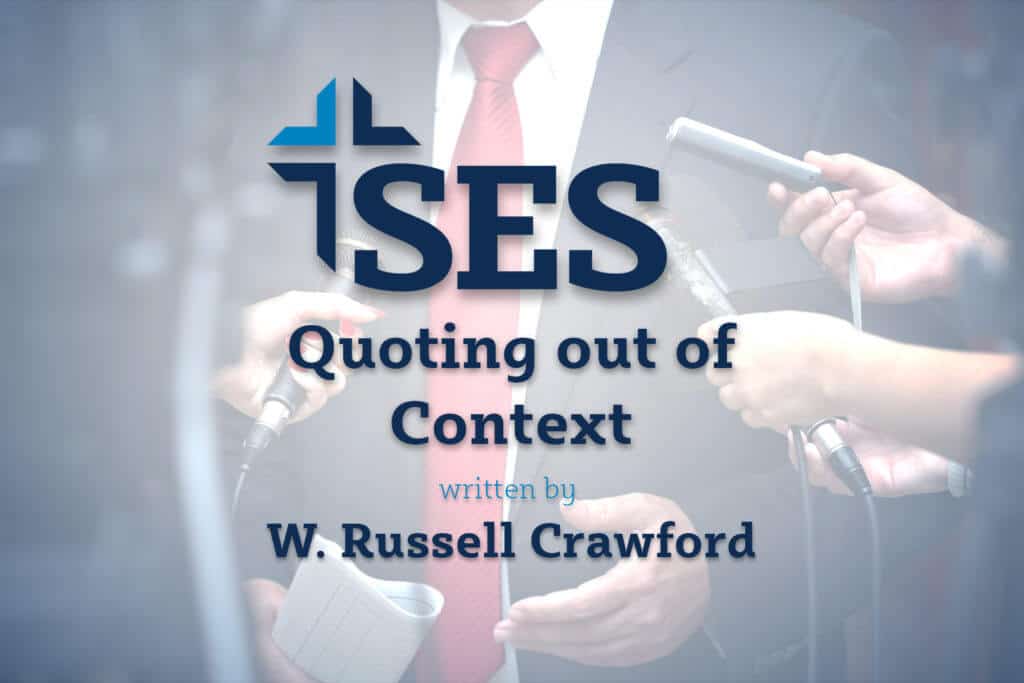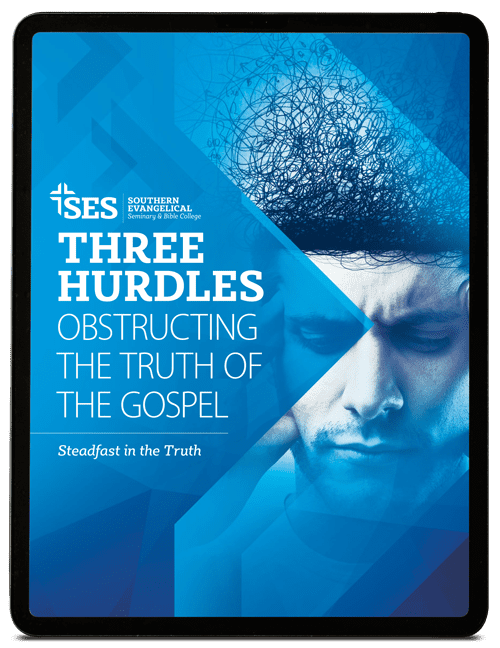[et_pb_section bb_built=”1″][et_pb_row][et_pb_column type=”4_4″][et_pb_text _builder_version=”3.0.67″ background_layout=”light” text_orientation=”left” border_style=”solid”]
Informal fallacies abound in social conversation, official debates, and even perhaps in how one even attempts to convince himself at times.However, fallacious mistakes in communication, though often rhetorically powerful, can be recognized once pointed out or given a name, as it were. This naming helps to eliminate the fog of such rhetoric, allowing one to see the misguided reasons an individual is offering for his conclusion. The outworking of such a practice, recognizing informal/material fallacies, is immensely beneficial for gauging arguments (in whatever form they may present themselves) in order to find truth, or conversely, to eliminate those arguments that are actually a hinderance to such a pursuit.
Quoting Out of Context, an informal, or material fallacy, is just such an example of a faulty understanding, which is then turn offered as a reason for some conclusion. As stated within the name, this particular fallacy is self-explanatory:
QOC happens when an individual quotes a statement that carried one nuanced meaning in its original conversation and context (literary or actual)¹ but then employs the same statement in such a way that the quote carries a meaning other than its original, to prove a point for which the statement was never intended.²
Because of the relative ease of recognizing such a fallacy, it may seem that it is not worth contemplating. However, the fallacy remains potent due to the fact that many hearers are not aware of the context out which the statement originated. Herein lies the power of such a fallacy. The concept is relatively easy to grasp; let us look to a few examples.
Notorious Examples
It is typical for so called ‘prosperity preachers’ to mangle passages of Scripture, quoting them out of context in order to arrive at their desired (financial) conclusion – a meaning other than the Scripture’s in-context-meaning. On at least one website, it is claimed that one need not worry over financial debt because, after all, according to Colossians 2:14 Christ has, “. . . canceled out the certificate of debt consisting of decrees against us, which was hostile to us; and he has taken it out of the way, having nailed it to the cross.”³ Viola, no more debt according to these alleged teachers. Yet, that is obviously, and radically, off the mark if one will simply bother to read the passage in its context. Clearly, the historical, contextual, and orthodox meaning of the statement/verse is grounded in the notion of one’s spiritual debt before a Holy God—not one’s American Express card. It is not difficult to see that this is incontestably lucid by simply reading the verse in its original context.
Variant offshoots of classical Christianity are also notorious to rob passages out of their original context in order to ground erroneous conclusions. For instance, a primary passage employed by the Jehovah’s Witnesses is Ecclesiastes 9:5. In their own translation (NWT) it states, “The living are conscious that they will die; but as for the dead, they are conscious of nothing at all.” It is argued that this proves that there is no consciousness after physical death and that no one is in the presence of Christ⁴ (contrary to the overall context, as well as the history of classical Christian thought and teaching. However, this is an example of a particular passage that has been taken out of context in light of the full teaching of Scripture. And thus we see that one should not draw theological applications from the book of Ecclesiastes out of its very nuanced context. The vast majority of the text is written from the perspective of merely life “under the sun” or what we might call atheistic nihilism in contemporary language (i.e., what it would be like if there were no God). For example, if you are going to draw theology from Ecclesiastes, tossing aside this perspective and context, one would also have to believe the following:
- It is pointless and worthless to even bother with serving and living for God (9:1-3)
- Wisdom is meaningless (1:17).
- Work is meaningless (2:18-23)
- Advancement is meaningless (2: 1-11).
- Everything is meaningless (1:2).
- It would be better to have never been born at all (4:3).
- One could go on and on.⁵
In other words, much of Ecclesiastes is not so much to draw theology, but witness what life would look like merely “under the sun,” the existential despair, if atheism were the ultimate truth of reality. This is most obvious when one takes into account the entire context of the rest of Christian texts (the Bible).⁶
This particular fallacy of QOC is not, however, monopolized merely by misdirected individuals in their efforts to interpret the meaning of religious texts. It is also seen within the political and social sphere as well. For instance, perhaps one of the most infamous examples of QOC occurs with the use of the phrase “separation of Church and State.” The most vocal advocates of the phrase are almost always employing the phrase in an effort to block those who hold to religious beliefs with political/government involvement. However, this is also a classic example of a quote that has been taken out of its context; an individual quotes a statement that carried one nuanced meaning in its original conversation and context but then employs the same statement in such a way that the quote carries a meaning other than its original, to prove a point for which the statement was never intended in order to “employ a statement that carried one nuanced meaning in its original conversation but then employ the same statement in order to prove a point for which the statement was never intended.” Moreover, it is exactly the opposite point that is being made in the original context. As authors Frank Turek and Norm Geisler note in their book Legislating Morality, the phrase was employed as a guarantee that the Church would be protected from the State, not vice versa:
In 1802 Jefferson responded to the Dansbury, Connecticut Baptists, who were concerned about a rumor that Jefferson was going to establish a national denomination. In his letter to assure them that this was not the case, Jefferson borrowed the words “the wall of seperation between church and state” from one of the Baptist’s own preachers, Roger Williams. . . . Jefferson echoed William’s sentiments that the church should be protected from interference by the government through a one-way “wall” (membrane) of protection. Jefferson wanted to protect the church from the government, not the other way around. He certainly didn’t mean that the mere mention of anything religious by the government was unconstitutional.⁷
The authors further prove that in its proper context (to guarantee that the Church would be protected from the State,) was the original intent of the statement. They do so by offering numerous examples of the actions of Jefferson regarding church/state relations even after having penned the letter to the Baptists in Dansbury. The use of “separation of church and state” is perhaps the most widely circulated example of the QOC fallacy that continues to maintain strong rhetorical value, though it is being used in a fallacious manner.
Conclusion
One could point to more examples within multiple topics, whether it be religion, history, literature, politics, conversation, debates, etc. to illustrate the point. However, it seems to be rather unnecessary since this fallacy has been unmasked by the above examples. As one discovers the context in which a statement was originally employed and discovers its actual intent or meaning, then it is relatively easy to discern whether the quotation actually serves to back up the meaning that is being claimed for the statement, to lead to the conclusion that is being offered. If the context is ignored, then the specific argument being offered should most likely be ignored as well.
[/et_pb_text][et_pb_divider _builder_version=”3.0.67″ show_divider=”on” color=”#0083ca” divider_style=”solid” divider_position=”top” divider_weight=”5″ hide_on_mobile=”on” saved_tabs=”all” /][et_pb_text _builder_version=”3.0.67″ background_layout=”light” text_orientation=”left” border_style=”solid”]
- Peter Kreeft, Socratic Logic: a Logic Text Using Socratic Method, Platonic Questions, and Aristotelian Principles, Edition 3.1, 3rd ed., ed. Trent Dougherty (South Bend, IN: St. Augustine Press, 2010), 90. Here Kreeft notes that the statement or phrase may be from an actual conversation, or it may simply have its genesis within a literary work.
- In fact, this is roughly similar to the fallacy of Equivocation in that a word/phrase is, in a sense, given more than one meaning.
- Unless otherwise indicated all Bible references in this piece are to the Zondervan NASB Thinline Bible (Grand Rapids: Zondervan, 2002).
- The Watchtower Bible and Tract Society, “What Happens When You Die?,” accessed August 15, 2017, https://www.jw.org/en/bible-teachings/questions/when-you-die/.
- This form of argument, using another’s own conclusions to reveal absurdities, is called a Reductio Ad Absurdum argument.
- An excellent resource that directly deals with the actual context of Scripture is Greg Koukl’s booklet Never Read a Bible Verse.
- Norman Geisler and Frank Turek, Legislating Morality: Is It Wise? Is It Legal? Is It Possible? 2nd ed. (Minneapolis, MN: Wipf & Stock Pub, 2003), 83.
[/et_pb_text][/et_pb_column][/et_pb_row][/et_pb_section]






